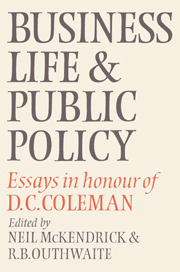Book contents
- Frontmatter
- Contents
- Preface
- List of contributors
- 1 Piscatorial politics in the early Parliaments of Elizabeth I
- 2 Marriage as business: opinions on the rise in aristocratic bridal portions in early modern England
- 3 Age and accumulation in the London business community, 1665–1720
- 4 The use and abuse of credit in eighteenth-century England
- 5 Convicts, commerce and sovereignty: the forces behind the early settlement of Australia
- 6 ‘Gentleman and Players’ revisited: the gentlemanly ideal, the business ideal and the professional ideal in English literary culture
- 7 The City, entrepreneurship and insurance: two pioneers in invisible exports – the Phoenix Fire Office and the Royal of Liverpool, 1800–90
- 8 ‘At the head of all the new professions’: the engineer in Victorian society
- 9 Bernard Shaw, Bertold Brecht and the businessman in literature
- 10 Lost opportunities: British business and businessmen during the First World War
- 11 Ideology or pragmatism? The nationalization of coal, 1916–46
- Bibliography of D. C. Coleman's published works
- Index
7 - The City, entrepreneurship and insurance: two pioneers in invisible exports – the Phoenix Fire Office and the Royal of Liverpool, 1800–90
Published online by Cambridge University Press: 07 October 2009
- Frontmatter
- Contents
- Preface
- List of contributors
- 1 Piscatorial politics in the early Parliaments of Elizabeth I
- 2 Marriage as business: opinions on the rise in aristocratic bridal portions in early modern England
- 3 Age and accumulation in the London business community, 1665–1720
- 4 The use and abuse of credit in eighteenth-century England
- 5 Convicts, commerce and sovereignty: the forces behind the early settlement of Australia
- 6 ‘Gentleman and Players’ revisited: the gentlemanly ideal, the business ideal and the professional ideal in English literary culture
- 7 The City, entrepreneurship and insurance: two pioneers in invisible exports – the Phoenix Fire Office and the Royal of Liverpool, 1800–90
- 8 ‘At the head of all the new professions’: the engineer in Victorian society
- 9 Bernard Shaw, Bertold Brecht and the businessman in literature
- 10 Lost opportunities: British business and businessmen during the First World War
- 11 Ideology or pragmatism? The nationalization of coal, 1916–46
- Bibliography of D. C. Coleman's published works
- Index
Summary
Convention has it that the institutions of the nineteenth-century City enjoyed unstinted financial and entrepreneurial success and that they prospered most dramatically over the period 1870–1914. This convention is not inaccurate but it is insensitive; it stands in need of much refinement.
Certainly the export of capital, insurance and shipping services from London in the half-century before the First World War constituted the greatest boom in invisible trade ever generated by an industrial economy. Its reputation is familiar and largely deserved. Moreover, that reputation has rubbed off on the bankers, underwriters and brokers who took the decisions about the loans, the policies and the cargoes. Whilst the manufacturing community of the late nineteenth century sits uneasily before a hung jury, few doubts have been aired concerning the calibre of their financial colleagues, and fewer aspersions cast. The present status of the indictment against the manufacturer, very broadly, is that some (many?) late-Victorian industrialists may have failed while others (most?) probably did not; the ‘some’, ‘many’ or ‘most’ depends mainly on the strength of the historian's doctrine, the length of his dossier and the flexibility of his algebra. Yet the bankers, underwriters et al. have almost entirely escaped such probing discussion.
They have escaped so well that one recent and persuasive analysis of Victorian society has proposed that it contained not one middle class but two distinct middle classes: the familiar provincial bourgeoisie based largely on industrial and mercantile activity and a much less publicized metropolitan bourgeoisie drawing its substance from the professions, from contracting, from finance and the other invisible trades.
- Type
- Chapter
- Information
- Business Life and Public PolicyEssays in Honour of D. C. Coleman, pp. 137 - 172Publisher: Cambridge University PressPrint publication year: 1986



